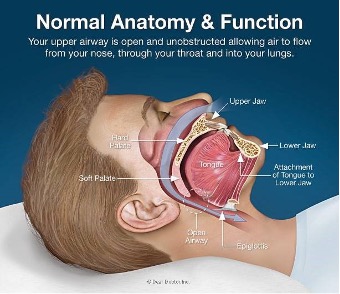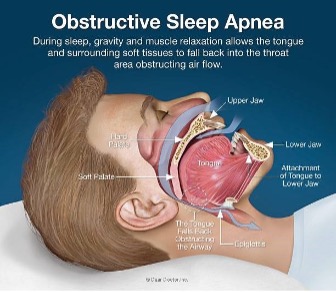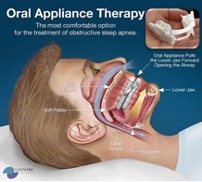As part of our services, our dentist, Dr. Jeffrey Brown, and the rest of our team at Sleep & TMJ Therapy provide sleep apnea treatments in Falls Church, Virginia. A visit to our office may not only help eliminate snoring but could also prevent serious problems for your overall health. Call our office at 703-821-1103 to schedule an appointment.
What Is Sleep Apnea?
Snoring is to obstructive sleep apnea (OSA) as thunder is to lightning. They may — but do not always — appear together. One may be just an annoyance, but the other may be the precursor to serious trouble. The pathology of snoring is the same as that of OSA, but not all people who snore have sleep apnea (although it is the most noticeable symptom). Snoring is associated with an increased risk of hypertension as well as an increased risk of both cardiovascular and cerebrovascular disease. The percentage that a person snores has been directly related to the prevalence of coronary disease. In other words, the more one snores, the greater the risk for stroke.


With obstructive sleep apnea, muscles of the soft palate at the base of the tongue and the uvula (the small, conical, fleshy tissue hanging from the soft palate) relax and sag, obstructing the airway and making breathing labored and noisy. Collapse of the airway walls can block breathing entirely. When breathing periodically stops, a listener hears the snoring broken by pauses. As pressure to breathe builds, muscles of the diaphragm work harder. Sleep is then temporarily interrupted, sometimes only for seconds. This, in turn, activates throat muscles and “un-corks” the airway. A listener hears deep gasping as breathing starts again. With each gasp, the sleeper awakens, but so briefly and incompletely that they do not remember doing so in the morning. Someone with obstructive sleep apnea may stop breathing for ten seconds or longer — dozens, even hundreds of times each night.;
Each time breathing stops, oxygen in the bloodstream falls and the heart must work harder to circulate blood. Blood pressure rises and over time may stay elevated after breathing restarts. The heart sometimes beats irregularly and may even pause for several seconds. This may account for some of the rare occurrences of people dying in their sleep after going to bed in apparent good health.
How Prevalent Are Sleep Disorders?
Sleep apnea and sleep disorders are very common in North America. Consider these facts:
- 1/4 of the U.S. population suffers from sleep disorders.
- 40 million individuals are chronic sufferers.
- Less than 10% have been diagnosed or treated to date.
- More than 40% of adults over 40 snore (87 million Americans).
- 24% of males and 18% of females suffer from snoring.
- 60% of males and 40% of females over the age of 60 snore (female snoring increases after menopause).
How Do I Know If I Have a Sleep Disorder?
Consider the following questions, and if you answer “yes” to the majority of them, you may have a sleep disorder and should schedule an evaluation.
- I have been told that I snore.
- I have been told that I stop breathing while I sleep, although I do not remember.
- I feel tired and irritable in the morning even though I slept through the night.
- I am having trouble controlling my weight.
- I sweat excessively during the night.
- I have noticed my heart pounding or beating irregularly during the night.
- I get morning headaches.
- I have trouble sleeping when I have a cold.
- I have jolted awake gasping for breath during the night.
- I am overweight.
How Do You Treat Sleep Apnea?
The dental solution to treating obstructive sleep apnea is to utilize a comfortable, removable oral appliance. The oral appliance is an articulated elastomeric mandibular advancement appliance. This dental device is designed to allow the advancement of the mandible through a controlled range of forward movement, while at the same time allowing for a limited amount of vertical and lateral movement of the mandible. This type of appliance has proven extremely effective in treating snoring and sleep apnea.

There are three component materials in a sleep appliance. The body of the appliance is constructed of elastomer, a pliable material that offers the patient a much greater degree of comfort than harder acrylic materials. For additional support to the teeth as well as the temporomandibular joint (TMJ), hard acrylic “bite pads” are placed in the molar regions. A commercially pure titanium articulating component grants the appliance the many adjustment characteristics that make the Silencer unique — it is kind to the tissues, the teeth and the TMJ.
These unique oral appliances are now a great choice for those who suffer from snoring and/or have mild to moderate OSA. If you think you suffer from OSA, do not hesitate to call our office and schedule an evaluation. You will be glad you did!
Additional Questions
- Should I schedule a sleep study?
A. If you are not positive you have sleep disorder, we recommend you meet with Dr. Brown for a consultation. At your initial appointment, Dr. Brown will perform a thorough craniofacial and airway exam to look for signs of sleep apnea. If he can identify a potential sleep problem, he may refer you to our local sleep center for a sleep study. Once the study is completed and we have a sleep disorder diagnosis, we can plan a custom, non-invasive appliance for you. If you prefer to have your primary care physician write you an order for a sleep study before you meet with Dr. Brown, that works as well! Just be sure to bring your sleep report to your appointment with you. - What is the best sleep apnea treatment?
A. Depending on your diagnosis, we recommend non-invasive custom-made appliances to target healthier sleep habits. Our patients have found the oral appliances to be less bulky and more comfortable and have received excellent results.
Visit our FAQ page by clicking HERE!
If you are ready to enjoy a healthy night’s sleep, call our office at 703-821-1103 and one of our team members will help you schedule your appointment for sleep apnea therapy in Falls Church, VA.
